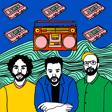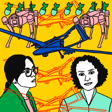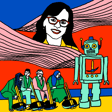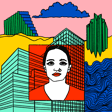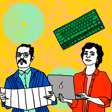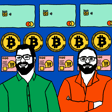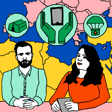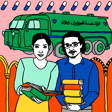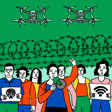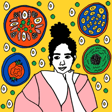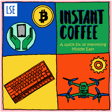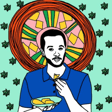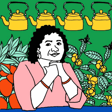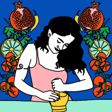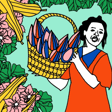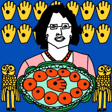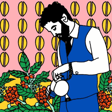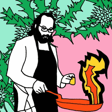Introduction to Season 3
00:00:03
Speaker
Welcome to season three of Instant Coffee. I'm Nadine Almanasvi. And I'm Sima Shehab. And this latest season is an exploration of technology and its developments in the region.
Beyond Chet GPT: Historical and Emerging Tech
00:00:14
Speaker
Beyond the emergence of Chet GPT and Sophia the Robot, we wanted to speak with people who are applying, adapting and reimagining technology in their fields.
Art and Technology with Nadeem Shulfi
00:00:22
Speaker
We will be exposed to medieval Islamic hospitals, failed Gulf techno cities, emerging Iraqi fintech startups, inclusive artificial intelligence and much more.
Material Histories and Dystopian Futures
00:00:31
Speaker
In this episode, Sima speaks to Lebanese visual artist Nadeem Shulfi about technology's impact on art meaning and art making in the region. Nadeem's own work is heavily reliant on technology, both in format and content. He describes his work as concerned with material histories and futures of innovation and desire. Don't worry, we'll find out more about what that means during the conversation.
00:00:54
Speaker
But what drew us to his work was its futuristic, dystopic atmosphere and the interdisciplinary use of artistic mediums that are both aesthetically pleasing and methodologically interesting.
Progress, Technology, and Relationships
00:01:06
Speaker
Nadim is currently a 2024 resident at the Jan van Eyck Academy in the Netherlands, a post-academic institute for research and production in the fields of fine art, design and art theory. Previously, he has also been co-programs director at the Beirut Art Centre. Hi, Nadim. Thank you for joining us on today's episode.
00:01:24
Speaker
We're very excited to have you on, and I'm very excited to talk to you about your own work and its relationship to technology, as well as the broader art world in the Middle East in the digital age. We'll get into discussing some of your specific pieces soon, but can you start by telling us a bit more about the themes of your work? What exactly are you interested in thinking about, and what does your work look at specifically?
00:01:47
Speaker
I mean, I guess to talk about my work, I'm largely interested in what is considered progress. That's usually related to innovation, which is in a big part technology, right? Most of my art is about relationships.
00:02:04
Speaker
that have to do with progress and technology but really like what are the relationships behind these systems. I am interested in trying to show this system from a different way with different maybe unexpected relationships that come out
Language, Chat Rooms, and Tech Limitations
00:02:18
Speaker
of it. Trying to put maybe not myself but a user in there as a form of audience experience to the work itself. Thank you for that Nadeep. Can you give us an example from your portfolio that demonstrates this unveiling of systems and meanings?
00:02:33
Speaker
have a work which is about chat rooms, early chat rooms in the Arab world, you know, where people would ask like, age, sex, location, where are you from? And these are kind of like what I also grew up on. And I had gotten ahold of an archive of one of these chat rooms by a researcher, there was this like immense desire on these chat rooms to constantly roleplay. Even if it was not in a romantic or sexual way, it was just
00:03:00
Speaker
constant form of changing identities and role-playing. So I decided to preserve the archive in this video, but then use a very robotic voice to show maybe how current technology, text-to-speech technology, cannot even understand the different tones and registers in the Arabic language that people were using. Like very beautiful play on words, very beautiful shifts in identity, you know?
00:03:26
Speaker
So yeah, in that way, I wanted to show how maybe language itself is a technology that people are pushing day by day, that technology of language actually can't keep up with that.
Environmental Futures in the Middle East
00:03:38
Speaker
So you have a really broad range of output. Which piece do you think really encompasses this wide range of themes and formats you embody in your work and would give the listeners a good sense of who you are as an artist? I'm thinking of which one
00:03:54
Speaker
I should talk about and I mean maybe I can start with the view from above takes my breath away fully just because it's a bit fresher in my head. It's kind of like the third project in a series where I think of examples of environmental futures in the Middle East. I decided after two projects of looking at environmental futures to look at like an environmental history of the Middle East.
00:04:16
Speaker
It started with this landmark program that UNESCO started, which was kind of its first global environmental project, that's for sure, called the arid land program, which was, they had the claim in the 1950s that all of the Middle East was gonna become a desert, so we have to green it up, you know? I quickly was drawn to how they visualized it. It almost seemed like the Middle East was like a theme park.
00:04:44
Speaker
the way they would kind of you know just like put grass everywhere in like any image about like kind of grilling all the deserts and it was so unrealistic that it was like comical but these things were taken very seriously to me i was like okay this is kind of very interesting to think of like what catches your attention in forms of playground and entertainment especially ones that like teach you about morals and
00:05:08
Speaker
So I kind of directly went to like also looking at Disney theme parks and that's kind of where this project really started which was when I was researching the Disney amusement park in Florida that was actually a master plan to become an ideal society like a complete city that ended up just becoming a theme park and I felt like that art
Media Influences and Unrealistic Visualizations
00:05:31
Speaker
where it was supposed to give so much life and then became this thing where you can only occupy during the day and probably as a worker or as a visitor and then leave at night was very telling of how the Middle East functioned within this massive project to green it so that it can actually extract its resources because the whole point was the whole world is now at the risk of hunger after World War II and we want to focus on the Middle East as a place to green it for the whole world to survive.
00:06:00
Speaker
That's kind of where the project kind of started and I went through this kind of like visual arc of what technologies were being used to show life or life enhanced by progress, by Disney, by UNESCO.
00:06:17
Speaker
buy nations in the Middle East that were part of this because you also have to remember that nation building at that time in the 50s was a major component of reshaping the Middle East and national projects and national ambitions. One thread that really captured me was the use of light as a way to show technology. And this still persists. Every iPhone advertisement now is like an iPhone flickering in darkness.
00:06:42
Speaker
you know, light as this like bearer of progress and life and heaven was heavily used in this project to show that it will become a greener, brighter future. So the whole lecture is really about telling these different narratives and then micro stories within certain nations of how progress was enacted, but really also following an arc of light shows that were happening.
00:07:09
Speaker
whether they were in Disney or in advertisements or in text and it kind of ends in a today's world about how the same notion of advancing the environment
Symbolism in Tech Narratives
00:07:20
Speaker
not to really have any environmental completeness, but to make it more efficient for consumption, is still being thought of today just with shinier renders. Actually, in the lecture, I use an advertisement of Neon, where it's this young girl, I think she's about, like, teenage, sitting down. She sees this kind of light radiating from a sphere, and it's beautifully rendered.
00:07:48
Speaker
And, you know, she runs towards the slight and dives head first, and suddenly she's transported to New York, and she's flying through it.
00:07:58
Speaker
In my lecture, that really reminded me of Ariel, the Little Mermaid, where she's underwater and she's singing. She wants to be part of the world. And then actually when she looks up, it's light just shining through the sea. Like there's no definition of what life is like in this world, but mainly just that light is this hope. And I kind of link this story of
00:08:22
Speaker
maybe this teen who was in this advertisement, I don't know what her life will be like, but you know one life is aerial where there's the risk of becoming voiceless by entering technology so quickly or entering progress so like head on without knowing what's actually in store. That whole ad for Neom
00:08:45
Speaker
to me was i think i've watched it like 60 times you know i even the way she floats around neom is how aladdin and jasmine go on their magic carpet in this movie aladdin and i also link that with the bird's eye view of looking at progress from this bird's eye view but actually what does it mean to be a person in this whole scheme in this nation building do you get the same luxuries of beauty when you're down there or
00:09:14
Speaker
or they just look pretty from the top.
Multimedia Art Forms and Research as Technology
00:09:16
Speaker
Yeah, so these are kind of the kind of negotiations I do or relationships I develop with images and lectures and where that goes. Thanks a lot for that Nadine, that's very interesting and I have so many questions I want to ask you. What drew us to your work was this unique style and format particularly through the use of film and lecture?
00:09:40
Speaker
Can you elaborate more on your preferred formats? What do they bring to the subject matter?
00:09:45
Speaker
I mean, so mainly I work in film, sculpture, and lectures, lecture performances. They each do something very different. For me, the films show how does it feel to live with this type of progress that I'm looking at, whatever the subject is. There's an emphasis on feeling or imagining what it would feel to live through such events. And then the sculptures kind of take on this abstracted encounters. I don't really have specific
00:10:15
Speaker
goals for them. I mean when I'm making them I'm like oh I want this to feel a bit weird or a bit off or I want the system to be clunky but really I don't have a pinpointed expression of how it will interact with the audience. In sculpture for example like I am really drawn to new material like synthetic material like silicon or plastic which we don't really consider now
00:10:41
Speaker
technology. I mean plastic is all around us but it is a form of technology that's constantly evolving. I use these new materials or I mean synthetic materials especially with sculpture and how I think of sculpture as a bodily interaction with an object. The scale when you blow these proportions up or make them so small you can make plastic become
00:11:06
Speaker
this intimate friend of yours instead of maybe an enemy to kind of go beyond the dichotomy of is this material good or bad and to kind of create nuances with what technology has built around us. And then the lecture performances come in to show how did I reach these stages within the films and sculptures.
00:11:27
Speaker
What type of research did I do to think of these artworks?
Research, Archives, and Digital Influence
00:11:31
Speaker
And I mean, the lecture performance is by itself an art form. You have the freedom to negotiate your relationship with the research that you are conducting, right?
00:11:42
Speaker
while in maybe other disciplines research will have a very standard methodology that you have to kind of go through and I know it's kind of like opening up more and more in different disciplines but you can also think of research as a technological tool you know for example in like still life paintings practicing the shadow is a form of research of how things can exist in the space and now we think of research as like no this thing where I have to kind of
00:12:09
Speaker
gather information. And that has to do with what technologies we engage with, you know, especially in like the surplus of information we have today. Maybe drawing a shadow isn't enough at this point. You have to show if the shadow was real or not or play with whether it was real or not. And I think my lecture performances take on this space where I show my research, but for me, what's more important is I kind of show my relationship to the research, how I negotiated
00:12:38
Speaker
A lot of it happens associatively. I work visually. My research is done very image-based or video-based. I consume a lot of content and that's kind of how technology plays a big role in it.
00:12:51
Speaker
the fact that I have access to archives online, that I have access to random content creators, the fact that, you know, if I'm interested in a subject, what's she going to show on page one of Google versus page five? Like that's actually like also a big thing to think of, like what information is presented to you and how much should you dig in and where should you leave things at
Future City Renders and Political Affect
00:13:12
Speaker
These lecture performances kind of are this mix of associations where some things are kept at surface level because I want to interrogate the surface of maybe just an image, while in another image I want to actually follow the life of someone in it. That's kind of the world that gets created in my lecture performances. These kind of narratives that trail off die down early, some stay till the end of the lecture, and then some all kind of clash at some point in the lecture.
00:13:42
Speaker
So it seems that affect plays a significant role in your art. Can you elaborate more on this, particularly looking at how it shapes your lecture performances? I often I try to think of what is the affective in the things that I'm looking at when I'm researching and then see how that can work in my work.
00:14:02
Speaker
So for example, in renders of future cities, spectacle is a major component in luring you into the future. The idea of that this is such a beautiful spectacle and it works, you know, I mean, like we are suckers for shiny new things.
00:14:19
Speaker
I then try to think of what would that mean if I instead of creating a spectacle for the future try to use that for a present moment and for example you know that translates in one of my films to a person running towards the sun where you just see the sun blubbing up and down and this like exasperated breath like running towards this spectacle of light to kind of create a small emotion in the viewer maybe not to
00:14:45
Speaker
Say it so clearly as how I'm saying it now, but really create a feeling about okay What does it mean to chase something you know whether it's a son or another thing or another form of progress really? I think it plays a big big role. I think the things I build and The films I make are not really about concise Analysis of what I look at or what I what I'm living there are more of experiences
Art, Technology, and Political Narratives
00:15:14
Speaker
And that for me is really important because I think of the affective as something that is political. There's like, for example, why are we disgusted from waste? Because in our culture, waste is supposed to disappear the second you discard it. It goes into your toilet, it goes into your trash, and it goes away. How you deal with waste, maybe also you have to deal with how you deal with disgust. And if you're going to live in a
00:15:43
Speaker
in the future are going to be full of waste, you have to also negotiate feelings of disgust. That's one example. And I think my films and works try to think of these feelings as social and political results and maybe push them in different directions. Can you share some pieces or artists whose work you find exciting that also explore the intersection of art and technology?
00:16:10
Speaker
There's a work by Monica Abbasbous and Sherbir Al Khouri. It's about a group of gamers that were playing PUBG during the Lebanese Revolution and somehow their gaming group slash WhatsApp group became like a news verification space for them, kind of seeing what was true, what was not, what was happening and this kind of like
00:16:31
Speaker
group sharing and that for me is a really interesting work on so many levels because the visuals are striking it's this group of friends that are playing this game that is about shooting each other it's a first-person game of killing each other I guess but then they overlay it with like how they were working together
00:16:50
Speaker
on this WhatsApp group and the type of language they were using with each other how they were supporting each other and it's kind of just fascinating to see their digital performance on this game as a form of also like stress release in some way from what's happening on the ground but then you think like wow but this game is also inherently in a way violent it kind of just gives you a lot of complexities to think about what does actually going offline or online mean you know what does it mean taking a break from the real world going on the digital world or
00:17:17
Speaker
taking a break from the digital world but going on the real world. And people that work with film in a very traditional way but then kind of create new ways of looking at an edit or a narrative are people that are dealing with technology, you know.
00:17:33
Speaker
in a very interesting way. You know, I think of, for example, I mean, this is a well-known work, but Rania Stefan, the Three Disappearances of Sahat Hosni, where she uses archives of Egyptian films to kind of retrace the life of Sahat Hosni.
Digital Culture's Impact on Art Production
00:17:48
Speaker
The editing in that is amazing of how you can reconstruct a life from basically someone who gave their life to the screen, to cinema.
00:17:58
Speaker
I'd like to ask you more about your understanding of the art world at the moment and specifically in the Middle East. I do think technology has changed the way we think of art meaning and art making. The current way of thinking of technology, which is that it is synonymous with digital culture and digital infrastructure. That to me is kind of really interesting because I mean, now we have, I want to say like two to three generations that grew up digitally.
00:18:26
Speaker
I think that that has had a lot of influence over how art is being produced in today's world, especially in the region. The reality is a lot of artists don't have studios. It's a very different world.
00:18:43
Speaker
than previous times, but they have their phones and they have their cameras on their phones. So you see this big jump in video art and a very specific language where they kind of show their own economy of attention and economy of distraction to politics and things that are happening around them.
00:19:03
Speaker
You know, now that you're asking this question, I'm thinking back and really, you know, the artists that don't show in galleries and institutions, the artists that post online on Instagram, you know, and really depict things that are happening within their country, their region, social activism.
00:19:21
Speaker
A lot of them are digital illustrators, for example. They don't operate in this art world that is exhibitions and institution-based, but they form a huge part of culture today in the Middle East and how information is spread around. And just going off of that, how has technology changed since you were growing up consuming media and thinking about being an artist? I grew up on Tumblr, like the social media platform that is called Tumblr, right?
00:19:49
Speaker
And I mean, to me, this is like super interesting because Tumblr was not really about show us what you look like, but like show us what aesthetics resemble you. It was kind of like, don't tell us who you are, tell us what your vibe is. You know, thinking of this now with Instagram now as the main medium, where it is like, no, please show us your face. Like we need to see your face. And thinking of this also with the rise of identity politics,
00:20:17
Speaker
artists from maybe an earlier generation were more interested in maybe what vibe was on Tumblr, which is like a set of relations outside of yourself. But now today it's like actually a set of relations that will show your identity. So I see a lot of artists, younger generation artists, making work about instead of the construction of the world, it's the construction of the world through their like a very specific body and
00:20:46
Speaker
space, which is super interesting. It kind of creates super localized narratives, you know? I think younger artists are inherently like done with anything of like a global culture. Artists online, let's say meme accounts, they are kind of breaking and they are artists. Actually, a lot of meme accounts in the Arab region are from artists and by artists, whether they're like not saying their name or not, but they are
00:21:10
Speaker
Or even if they don't consider themselves artists, I think of them as really good artists.
Art's Role in Navigating New Tech
00:21:15
Speaker
You know, they are kind of thinking beyond what does identity politics hold for me?
00:21:20
Speaker
because the way they cannibalize content outside of just their body and their identity. And if we think of Arab meme accounts, you have these super niche like Iraqi, Lebanese, Saudi, and then you have the kind of neutral ones that kind of just cannibalize everything. I think this has influenced a lot of artists.
00:21:40
Speaker
At the heart of everything I do, I think of negotiating what does it mean to live with meaning, meaning put on you or put against you or meaning you can live with. Progress is a big part of that. These small things I do and the things I look at, they do show that
00:21:58
Speaker
There are spaces for me to kind of dictate how I want to interact with them. That there are also different ways of connecting things and with other people and how you connect to other people.
00:22:11
Speaker
beyond the normalized kind of communication paths, let's say like accepted forms of thinking, because that's kind of what art can really give you, especially art that deals with new technology. It really kind of considers like, wait, what is the thought process behind this? And why is it this way? Why is VR immersive, but not like reading a book? I mean, if it's a good book, it's just as immersive.
00:22:36
Speaker
is we are immersive because it pushes you into a world and like kind of shuts off all the other senses that doesn't really sound immersive that sounds a bit forced you know like these these are kind of what artists are thinking of now with new technology because it really emphasizes that you have to think of what meanings come out of it you know what does immersive mean in that kind of position
Episode Wrap-up and Further Resources
00:22:59
Speaker
I think that's all we have time for today, but thank you so much for taking the time to speak to us. We really enjoyed it, and I hope you enjoyed it just as much as we did. Thank you for listening to Instant Coffee, a podcast brought to you by the LSE Middle East Centre. Join us every other Tuesday for a new episode. To learn more about Nadim's work, follow the links in the podcast description. And don't forget to follow us on your favourite streaming platforms.

